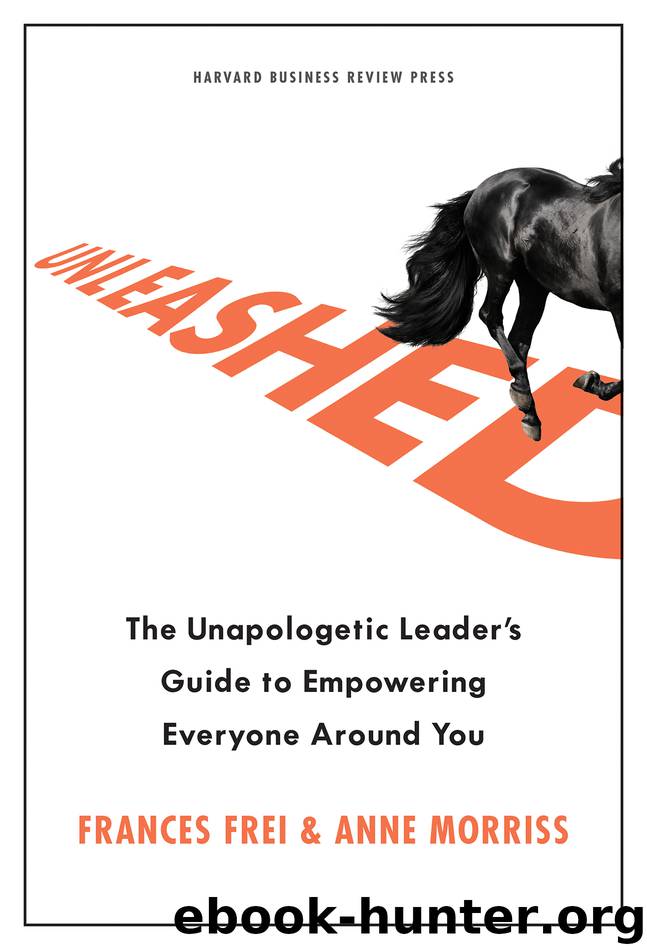Unleashed by Frances Frei

Author:Frances Frei
Language: eng
Format: epub
ISBN: 9781633697058
Publisher: Harvard Business Review Press
Published: 2020-04-15T16:00:00+00:00
* Note that we use the terms “queer” and “LGBT+” interchangeably, both in this book and in our own conversations.
Development is the deliberate investment in the growth and evolution of the people around you. Development can be both formal (e.g., training programs and corporate universities) and informal (e.g., mentoring and access to stretch assignments). As we’ve revealed at this point, we believe passionately in the value of both types, and we’re convinced that people can grow at lightning speed with the right kind of developmental investment.
Some leaders resist the concept of development, preferring a “sink or swim” approach rooted in the following logic: hire as well as you can, make the job requirements clear, largely leave people alone to figure out how to thrive, and may the best people win. The idea here is that a healthy meritocracy is a substitute for development, with the added kicker of helping you sort the strong from the weak.
This approach may seem reasonable on the surface, but it tends to get wobbly in execution. One reason is that informal development is happening all of the time, whether or not you code it as such. And it is rarely distributed fairly: some of your best “swimmers” have easy access to it, while other people, as a colleague of ours recently characterized, are experiencing a daily ice-bucket challenge. What’s worse, we often throw people who are different from us into the deep end, without realizing how much informal scaffolding we’re giving to people who are like us, in ways we sometimes don’t recognize as developmental, such as a casual conversation at the preschool fundraiser. Even if you believe in sink or swim—and to be clear, we emphatically don’t—it’s important to make sure that informal practices aren’t disadvantaging some.
What does informal development look like? It might be selecting who gets the special project with access to important clients, or who gets to participate on strategic site visits with senior leaders. These opportunities are rarely distributed thoughtfully when we rely on them happening organically, and so we should stop relying on them happening organically. Instead, make access to informal development as deliberate and systematic as you can. Train people on how to do it well—both how to develop others and how to get the support and input you need to succeed—and find ways to keep yourself honest on how well it’s going for everyone on the team.
Which brings us back to formal development. Informal development can go a long way, but often not far enough, particularly for high-growth organizations. Again, one of the lessons of working with Uber is that when organizations are moving at a rapid speed, there’s rarely enough time and space for sufficient informal support and mentorship, particularly for managers. Early-stage companies run an added risk of underinvesting in an HR skill set, which means they sometimes don’t know what they don’t know in terms of the value and mechanics of people development. Formal development programs can help address these dynamics, and increasingly there are ways to do it without breaking the bank or distracting people from their day jobs.
Download
This site does not store any files on its server. We only index and link to content provided by other sites. Please contact the content providers to delete copyright contents if any and email us, we'll remove relevant links or contents immediately.
| Ethics | Etiquette |
| Fashion & Image | Health & Stress |
| Motivation & Self-Improvement | Work Life Balance |
| Workplace Culture |
Tools of Titans by Timothy Ferriss(8396)
Change Your Questions, Change Your Life by Marilee Adams(7781)
Deep Work by Cal Newport(7083)
Playing to Win_ How Strategy Really Works by A.G. Lafley & Roger L. Martin(6305)
Man-made Catastrophes and Risk Information Concealment by Dmitry Chernov & Didier Sornette(6019)
Big Magic: Creative Living Beyond Fear by Elizabeth Gilbert(5771)
Digital Minimalism by Cal Newport;(5764)
Ego Is the Enemy by Ryan Holiday(5448)
The Slight Edge by Jeff Olson(5417)
The Motivation Myth by Jeff Haden(5212)
The Laws of Human Nature by Robert Greene(5208)
Stone's Rules by Roger Stone(5088)
Tuesdays with Morrie by Mitch Albom(4784)
Eat That Frog! by Brian Tracy(4540)
Rising Strong by Brene Brown(4459)
Skin in the Game by Nassim Nicholas Taleb(4248)
The Money Culture by Michael Lewis(4207)
Bullshit Jobs by David Graeber(4190)
Skin in the Game: Hidden Asymmetries in Daily Life by Nassim Nicholas Taleb(4007)
